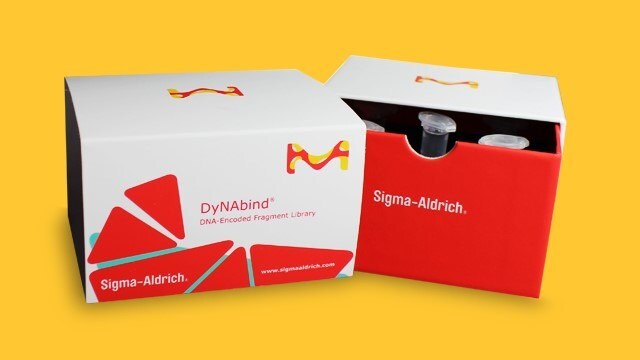DNA-Encoded Library Technology for Drug Discovery

DNA-encoded library (DEL) technology has revolutionized drug discovery by allowing for the efficient screening and identification of potential drug candidates. DELs offer several advantages over traditional small molecule libraries, such as the ability to screen large numbers of compounds in a single experiment, high chemical diversity, and information-rich screening data.
It is now possible to access innovative DEL technology for hit identification, lead optimization, and target deconvolution with DyNAbind®. DEL kits minimize startup costs and lead times by providing pre-assembled compound libraries and the necessary materials, protocols, and reagents to enable high-throughput screening.
Our DEL offerings:
DYNA001 DNA-Encoded Fragment Library enhances the precision of target screening. Fragment-based drug discovery employs small, low-molecular-weight compounds, or fragments, that serve as starting points for drug design. DELs can be screened against a target to identify fragment hits, which can be elaborated into larger compounds.
DYNA002 10 Million Compound DNA-Encoded Library Kits contain at least 10 million small molecule compounds that bind to specific targets. Available in 2 or 5 vial kits, the concentration is optimized so each vial tests for a single condition. The cost of the library includes generating a list of 50 hits or up to 60 hits if there are ties. All hit structures are revealed at no extra charge and there are no additional licensing fees incurred for the use of hits in research and development or manufacturing.
DELDATA provides extensive and detailed information on all the hits obtained from the screening of DYNA002. This data package serves as a catalyst for the development of advanced predictive models, optimization algorithms, and machine learning strategies for AI-powered lead discovery.
How Do DELs Work?
In a DNA-encoded library, each chemical structure is attached to a unique DNA sequence that serves as a barcode. This DNA tag encodes information about the attached chemical structure, so each structure is uniquely identifiable. The technique enables the creation of vast libraries of different structure. In the screening process, the library is exposed to a target protein, such as an enzyme or receptor implicated in a disease. Chemical structures that bind to the target will attach to it along with their DNA tags. After the binding step, the non-binders are washed away, leaving only the structures that have successfully bound to the target. Next-generation sequencing is then performed on the DNA tags of the structures that have successfully attached to the target, identifying which ones have interacted with the target and revealing potential drug candidates.
Key Benefits
- Enhanced Chemical Diversity: DELs provide access to an enormous chemical diversity due to the large number of compounds that can be encoded and screened simultaneously. This diversity enables exploration of a broad range of chemical space, increasing the chances of identifying novel and potent compounds.
- High-Throughput Screening: DELs enable the screening of millions to billions of compounds in a single experiment, allowing for rapid hit identification. This high-throughput screening capability accelerates the lead discovery process and reduces the time required for identifying potential drug candidates.
- Cost and Time Efficiency: The use of DNA-Encoded Libraries reduces the amount of material needed for screening and eliminates the need for individual compound purification and handling, streamlining the workflow and minimizing costs.
DEL Applications
DELs are valuable for target validation studies, allowing researchers to identify and validate potential drug targets. Furthermore, DELs can be used for fragment-based lead generation, where small molecule fragments are screened against a target of interest to identify leads for subsequent optimization. Additionally, DNA-Encoded Libraries have proven useful in Chemical Biology research for understanding target interactions, identifying protein-protein interactions, and exploring new chemical space.
Related Resources
- Fragment-Based DNA-Encoded Library
Dynamic Library technology in drug discovery delivers reliable results with high chemical diversity, suitable for various targets.
- Future of Drug Discovery with DNA Encoded Libraries
DNA encoded libraries (DELs) offer a paradigm shift in drug discovery by leveraging molecular biology and high-throughput screening. DELs offer a full high-throughput screening library in one vial. Along with our DEL data package, machine learning and AI can be utilized to determine even more information on targets.
- /deepweb/assets/sigmaaldrich/marketing/global/documents/102/108/acta-52-3-ms.pdf
Aldrichimica Acta issue focused on DNA-Encoded Libraries
- /KR/en/campaigns1/lead-generation/shaping-future-drug-discovery-dna-encoded-libraries
Download our whitepaper to discover how DEL technology can be the key to unlocking new and innovative therapeutic opportunities.
To continue reading please sign in or create an account.
Don't Have An Account?